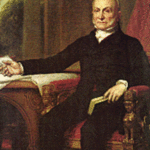Samuel Adams was born on September 27, 1722. His legacy includes many notable achievements as a statesman and patriot. The greatest of these is arguably his role as one of the founding fathers of this nation. He, along with the other representatives at the Second Continental Congress signed one of the founding documents of America, the Declaration of Independence. This act forever tied their fates with the future success or failure of the new democracy.
As a young man, Samuel Adams was raised in an influential family. He moved away to study as a business man at Harvard University and the Boston Latin School. After a few years in this pursuit however, he found that his true strength and ambition lay in politics. He got on with a company in Boston, but shortly afterwards he was fired. His employer said that the reason for this was because Adams, as an apprentice, showed very little conviction or interest in the area of commercial enterprise. The employer is quoted as saying “I thought I was training a businessman, not a politician!”
John Adams’ father then gave him one thousand pounds as a capital sum so that he might start his own business. Immediately after receiving the money, Adams nobly loaned half of it to a friend who was going through some hard times financially. Owing to his ineptitude as a businessman, the remaining amount was gone after Adams failed to establish a successful enterprise. He then went back to work for his father who was a brewer. During that time many people called Adams “Sam the Malster” because his job included carrying bags of malt from place to place.
Shortly afterwards, he began his career as a political writer. His earlier education at Harvard and his readings about the Greeks and Romans greatly influenced his thoughts. His ideas were very well accepted and many believe that the American Revolution would not have been the same had Adams not been able to write down and explain the sentiments and ideas that led to America’s independence. He was later recognized as a “Patriarch of Liberty” by Thomas Jefferson. Furthermore, one of his cousins and fellow politicians is quoted as saying, “Without the character of Samuel Adams, the true history of the American Revolution can never be written. For fifty years his pen, his tongue, his activity, were constantly exerted for his country without fee or reward.” This and other opinions that were expressed around that time give an idea of the esteem in which Adams was held by his countrymen.
Adams was originally recognized for his role in establishing an organized opposition to the unfair policies and taxes imposed upon the American colonies by the British government. Some examples of these early activities include his involvement in the drafting of the Stamp Act Resolution. He was a member of the Sons of Liberty, which was responsible for the event which came to be known as the Boston Tea Party. This dissention served to fuel the fire of the Revolution.
The United States declared its independence in 1776, and shortly afterwards Samuel Adams helped to draft the Massachusetts Constitution. He would go on to become a central figure on the American Revolution, afterward helping to guide the burgeoning democracy that he helped to create. Adams is a very interesting figure, because of his seemingly contradictory nature. He couldn’t even pay his own bills, but somehow he was able to shape the foundation of the most powerful nation on Earth. I believe that one of the best lessons we can take from his life is the value of perseverance in the face of defeat. During his own life and the early life of America, no matter what the challenge or setback, he never gave up.


